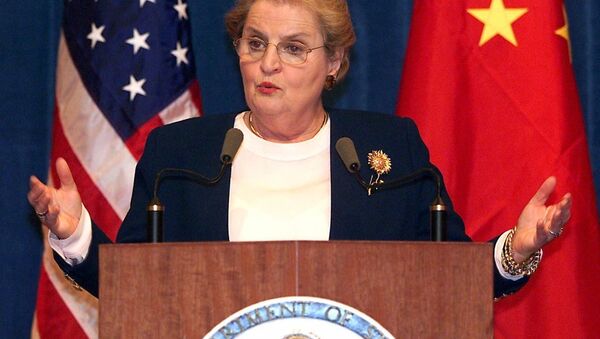Madeleine Albright is a well-known political figure. The fact that she is the first female United States Secretary of State is a feat in its own kind, but her time in office has allowed her to achieve new heights. Her being a woman in the boys club that is high politics is one thing – her being a refugee to begin with is another. She was born Marie Jana Korbelova in a wealthy and well-respected family in Czechoslovakia in 1937, but things quickly took a turn for the worst. In a 2013 video produced by The International Rescue Committee, she noted:
I was a refugee during World War II in England as a little girl and lived through the Blitz. I then went back and had a fairly glorious life as a daughter of an ambassador. And then all of a sudden we were again refugees, and came to the United States with nothing.
With her Americanized name Madeleine, but still at the time Korbelova, she spent her adolescent years in Denver. This is where her interest in international politics, perhaps stemming from her life in a persecuted diplomat’s family, manifested itself. While in school, Madeleine won a UN-sponsored competition by correctly naming all the member states of the organization. She also founded the Kent Denver School international relations club and was its first president before graduating in 1955.
Such interest in international relations and the United Nations was not in vain. After putting in the work, graduating from Columbia University and earning her PhD, climbing the political ladder at the Democratic Party, she finally reaped the fruit of her labors. In 1993 she was appointed Ambassador to the United Nations. This wasn’t an easy job for her, as apparently her relations with Secretary of State were strained. She was granted the chance to run things differently four years later, when Clinton nominated her for the Secretary of State position. The US Senate confirmed her with a unanimous vote.
Her policies were aimed at securing human rights and promoting peace abroad. As she wasn’t born in the United States, Albright could not become president – although there were rumors she’d pursue a career in Czech politics, but she remained in the United States and continues to work in international relations.
In a 2008 Memo to the President Elect: How We Can Restore America's Reputation and Leadership, Madeleine Albright highlighted:
There is a significant moral difference between a person who commits a violent crime and a person who tries to cross a border illegally in order to put food on the family table. Such migrants may violate our laws against illicit entry, but if that's all they do they are trespassers, not criminals. They deserve to have their dignity respected.
Her view of the way the world works, which she tried to reflect in her political career, is perhaps best reflected in her statement made at a naturalization ceremony for new American citizens: "Today marks a new beginning in your lives. And an ongoing chapter in the story of America which is, above all else, the story of immigrants.” She has given the speech in n 1998, commemorating 50 years since she herself came to the United States and began a new life.

